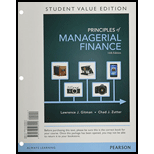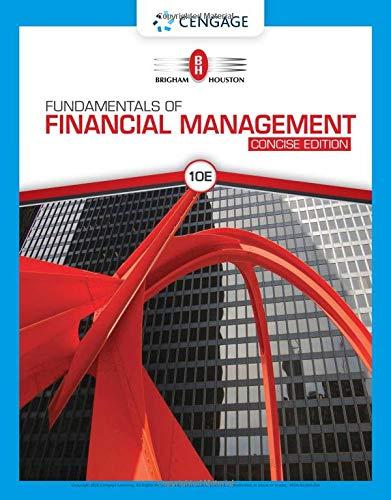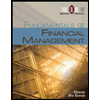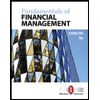
Principles of Managerial Finance, Student Value Edition Plus NEW MyLab Finance with Pearson eText -- Access Card Package (14th Edition)
14th Edition
ISBN: 9780133740912
Author: Lawrence J. Gitman, Chad J. Zutter
Publisher: PEARSON
expand_more
expand_more
format_list_bulleted
Question
Chapter 7, Problem 7.19P
Summary Introduction
To determine: The valuation price/earnings multiples
Introduction:
Valuation multiples refers to the expression of assets in the market value which is related to some statistical values. Most commonly used multiples is price/earnings multiples.
Expert Solution & Answer
Want to see the full answer?
Check out a sample textbook solution
Students have asked these similar questions
Calculate dividends problem tutor..
Please solve this question by using appropriate method.
I mistakenly submitted blurr image please don't answer .
comment please i will write values.
Chapter 7 Solutions
Principles of Managerial Finance, Student Value Edition Plus NEW MyLab Finance with Pearson eText -- Access Card Package (14th Edition)
Ch. 7.1 - What are the key differences between debt and...Ch. 7.2 - What risks do common stockholders take that other...Ch. 7.2 - Prob. 7.3RQCh. 7.2 - Explain the relationships among authorized shares,...Ch. 7.2 - Prob. 7.5RQCh. 7.2 - Prob. 7.6RQCh. 7.2 - Explain the cumulative feature of preferred stock....Ch. 7.2 - Prob. 7.8RQCh. 7.2 - Prob. 7.9RQCh. 7.2 - Prob. 7.10RQ
Ch. 7.2 - Prob. 7.11RQCh. 7.3 - Prob. 1FOECh. 7.3 - Describe the events that occur in an efficient...Ch. 7.3 - Prob. 7.13RQCh. 7.3 - Describe, compare, and contrast the following...Ch. 7.3 - Describe the free cash flow valuation model, and...Ch. 7.3 - Explain each of the three other approaches to...Ch. 7.4 - Prob. 7.17RQCh. 7.4 - Assuming that all other variables remain...Ch. 7 - Prob. 1ORCh. 7 - Prob. 7.1STPCh. 7 - Prob. 7.2STPCh. 7 - Prob. 7.1WUECh. 7 - Prob. 7.2WUECh. 7 - Prob. 7.3WUECh. 7 - Prob. 7.4WUECh. 7 - Prob. 7.5WUECh. 7 - Prob. 7.6WUECh. 7 - Authorized and available shares Aspin...Ch. 7 - Prob. 7.2PCh. 7 - Learning Goal 2 P7-3 Preferred dividends In each...Ch. 7 - Learning Goal 2 P7-4 Convertible preferred stock...Ch. 7 - Learning Goal 4 P7-5 Preferred stock valuation TXS...Ch. 7 - Prob. 7.6PCh. 7 - Preferred stock valuation Jones Design wishes to...Ch. 7 - Learning Goal 4 P7-8 Common stock value: Constant...Ch. 7 - Common stock value: Constant growth McCracken...Ch. 7 - Prob. 7.10PCh. 7 - Prob. 7.11PCh. 7 - Prob. 7.12PCh. 7 - Learning Goal 4 P7-14 Common stock value: Variable...Ch. 7 - Prob. 7.14PCh. 7 - Prob. 7.15PCh. 7 - Prob. 7.16PCh. 7 - Prob. 7.17PCh. 7 - Prob. 7.19PCh. 7 - Prob. 7.20PCh. 7 - Prob. 7.21PCh. 7 - Prob. 7.22PCh. 7 - Prob. 7.23PCh. 7 - Prob. 7.24P
Knowledge Booster
Learn more about
Need a deep-dive on the concept behind this application? Look no further. Learn more about this topic, finance and related others by exploring similar questions and additional content below.Similar questions
- Assume that the following statements of financial position are stated and a book value. Alpha Corporation Current Assets $15,000 Current Liabilities $5,400 Net Fixed Assets 39,000 Long-Term Debt 10,100 Equity 38,500 $54,000 $54,000 Beta Corporation Current Assets $3,600 Current Liabilities $1,400 Net Fixed Assets 6,700 Long-Term Debt 2,100 Equity 6,800 $10,300 $10,300 Suppose the fair market value of Beta’s fixed assets is $9,500 rather than the $6,700 book value shown. Alpha pays $17,300 for Beta and raises the needed funds through an issue of long-term debt. Construct the post-merger statement of financial position now, assuming that the purchase method of accounting is used.arrow_forwardThe shareholders of Barley Corporation have voted in favor of a buyout offer from Wheat Corporation. Information about each firm is given here: Barley Wheat Price/earnings ratio 13.5 21 Shares outstanding 90,000 210,000 Earnings $180,000 $810,000 Barley shareholders will receive one share of Wheat stock for every three shares they hold of Barley. Required What will the EPS of Wheat be after the merger? What will be the P/E ratio if the NPV of the acquisition is 0? What must Wheat feel is the value of the synergy between these two firms? Explain how your answer can be reconciled with the decision to go ahead with the takeover?arrow_forwardBlack Oil Company is trying to decide whether to lease or buy a new computer-assisted drilling system for its extraction business. Management has already determined that acquisition of the system has a positive NPV. The system costs $9.4 million and qualifies for a 25% CCA rate. The equipment will have a $975,000 salvage value in five years. Black Oil’s tax rate is 36%, and the firm can borrow at 9%. Cape Town Company has offered to lease the drilling equipment to Black Oil for payments of $2.15 million per year. Cape Town’s policy is to require its lessees to make payments at the start of the year. Suppose it is estimated that the equipment will have no savage value at the end of the lease. What is the maximum lease payment acceptable to Black Oil now?arrow_forward
- Space Exploration Technology Corporation (Space X), is an aerospace manufacturer that sells stock engine components and tests equipment for commercial space transportation. A new customer has placed an order for eight high-bypass turbine engines, which increase fuel economy. The variable cost is $1.6 million per unit, and the credit price is $1.725 million each. Credit is extended for one period, and based on historical experience, payment for about one out of every 200 such orders is never collected. The required return is 1.8% per period. Required Assuming that this is a one-time order, should it be filled? The customer will not buy if credit is not extended. What is the break-even probability of default in part 1? Suppose that customers who don’t default become repeat customers and place the same order every period forever. Further assume that repeat customers never default. Should the order be filled? What is the break-even probability of default?arrow_forwardSouth African Airlines is contemplating leasing a high-tech tracker for its fleet of airplanes. Leasing is a very common practice with expensive, high-tech equipment. The scanner costs $6.3 million and it qualifies for a 30% CCA rate. Because of the rapid progression of technology, the high-tech tracker will be valued at $0 in 4 years. You can lease it for $1.875 million per year for four years. Assume that assets pool remains open and payments are made at the end of the year. Assuming a tax rate of 37%. You can borrow at 8% pre-tax. Should you lease or buy?arrow_forwardBlack Oil Company is trying to decide whether to lease or buy a new computer-assisted drilling system for its extraction business. Management has already determined that acquisition of the system has a positive NPV. The system costs $9.4 million and qualifies for a 25% CCA rate. The equipment will have a $975,000 salvage value in five years. Black Oil’s tax rate is 36%, and the firm can borrow at 9%. Cape Town Company has offered to lease the drilling equipment to Black Oil for payments of $2.15 million per year. Cape Town’s policy is to require its lessees to make payments at the start of the year. What is the NAL for Black Oil Company? What is the maximum lease payment that would be acceptable to the company?arrow_forward
- Iceberg Corporation currently has an all-equity capital structure. The company is considering a new structure that holds 30% debt. There are 6,500 shares outstanding and the price per share is $45 today. EBIT is expected to remain at $29,000 per year forever. The interest rate on new debt is 8%, and there are no taxes. Required Justin, a shareholder of the firm, owns 100 shares of stock. What is his cash flow under the current capital structure, assuming the company has a dividend payout rate of 100%? What will Justin’s cash flow be under the proposed capital structure of the firm? Assume he keeps all 100 of his shares. Suppose the company does convert, but Justin prefers the current all-equity capital structure. Show how he could unlever his shares of stock to recreate the original capital structure.arrow_forwardCovehead Lighthouse Corporation is considering a change in its cash-only policy. The new terms would be net one period. Based on the following information, determine if Covehead Lighthouse should proceed or not. The required rate of return is 2.5% per period. Current Policy New Policy Price per unit $73 $75 Cost per unit $38 $38 Unit sales per month 3,280 3,390arrow_forwardThe YYY and ZZZ Company are two firms whose business risk are the same but that have different dividend policies. YYY pays no dividend, whereas ZZZ has an expected dividend yield of 4%. Suppose the capital gains tax rate is zero, whereas the income tax rate is 35%. YYY has an expected earnings growth rate of 15% annually, and its stock price is expected to grow at this same rate. If the after-tax expected returns on the two stocks are equal, what is the pre-tax required return on ZZZ stock?arrow_forward
- Charlie Corporation is analyzing the possible acquisition of Delta Inc. Neither firm has debt. The forecasts of Charlie show that the purchase would increase its annual after-tax cash flow by $425,000 indefinitely. The current market value of Delta is $8.8 million. The current market value of Charlie is $22 million. The appropriate discount rate for the incremental cash flows is 8%. Charlie is trying to decide whether it should offer 35% of its stock or $12 million in cash to Delta. Required What is the synergy from the merger? What is the value of Delta to Charlie? What is the cost to Charlie of each alternative? What is the NPV of Charlie of each alternative?arrow_forwardParadox Corporation is evaluating an extra dividend verses a share repurchase. In either case, $14,500 would be spent. Current earnings are $1.65 per share, and the stock currently sells for $58 per share. There are 2,000 shares outstanding. Ignore taxes and other imperfections in answering the following questions: Required Evaluate the two alternatives in terms of the effect on the price per share of the stock and shareholder wealth. What will be the effect on Paradox Corporation’s EPS and P/E ratio under the two different scenarios? In the real world, which of these actions would you recommend? Why?arrow_forwardThe statement of financial position, from a market value, is shown below for AAA Corporation. AAA has declared a 25% stock dividend. The stock goes ex dividend tomorrow. There are currently 13,000 shares of stock outstanding. What will the ex-dividend price be? Market Value Statement of Financial Position Cash $83,000 Debt $121,000 Fixed Assets 575,000 Equity 537,000 Total $658,000 Total $658,000arrow_forward
arrow_back_ios
SEE MORE QUESTIONS
arrow_forward_ios
Recommended textbooks for you
- Century 21 Accounting Multicolumn JournalAccountingISBN:9781337679503Author:GilbertsonPublisher:Cengage
 Cornerstones of Financial AccountingAccountingISBN:9781337690881Author:Jay Rich, Jeff JonesPublisher:Cengage Learning
Cornerstones of Financial AccountingAccountingISBN:9781337690881Author:Jay Rich, Jeff JonesPublisher:Cengage Learning Fundamentals Of Financial Management, Concise Edi...FinanceISBN:9781337902571Author:Eugene F. Brigham, Joel F. HoustonPublisher:Cengage Learning
Fundamentals Of Financial Management, Concise Edi...FinanceISBN:9781337902571Author:Eugene F. Brigham, Joel F. HoustonPublisher:Cengage Learning  Fundamentals of Financial Management, Concise Edi...FinanceISBN:9781285065137Author:Eugene F. Brigham, Joel F. HoustonPublisher:Cengage Learning
Fundamentals of Financial Management, Concise Edi...FinanceISBN:9781285065137Author:Eugene F. Brigham, Joel F. HoustonPublisher:Cengage Learning Fundamentals of Financial Management, Concise Edi...FinanceISBN:9781305635937Author:Eugene F. Brigham, Joel F. HoustonPublisher:Cengage Learning
Fundamentals of Financial Management, Concise Edi...FinanceISBN:9781305635937Author:Eugene F. Brigham, Joel F. HoustonPublisher:Cengage Learning Survey of Accounting (Accounting I)AccountingISBN:9781305961883Author:Carl WarrenPublisher:Cengage Learning
Survey of Accounting (Accounting I)AccountingISBN:9781305961883Author:Carl WarrenPublisher:Cengage Learning

Century 21 Accounting Multicolumn Journal
Accounting
ISBN:9781337679503
Author:Gilbertson
Publisher:Cengage

Cornerstones of Financial Accounting
Accounting
ISBN:9781337690881
Author:Jay Rich, Jeff Jones
Publisher:Cengage Learning

Fundamentals Of Financial Management, Concise Edi...
Finance
ISBN:9781337902571
Author:Eugene F. Brigham, Joel F. Houston
Publisher:Cengage Learning

Fundamentals of Financial Management, Concise Edi...
Finance
ISBN:9781285065137
Author:Eugene F. Brigham, Joel F. Houston
Publisher:Cengage Learning

Fundamentals of Financial Management, Concise Edi...
Finance
ISBN:9781305635937
Author:Eugene F. Brigham, Joel F. Houston
Publisher:Cengage Learning

Survey of Accounting (Accounting I)
Accounting
ISBN:9781305961883
Author:Carl Warren
Publisher:Cengage Learning
Investing For Beginners (Stock Market); Author: Daniel Pronk;https://www.youtube.com/watch?v=6Jkdpgc407M;License: Standard Youtube License